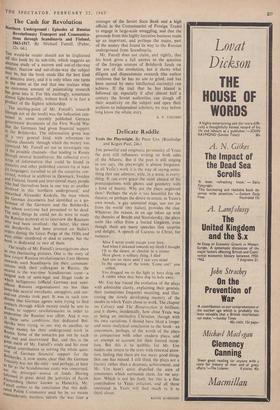Delicate Raddle
Yeats the Playwright. By Peter Ure. (Routledge and Kegan Paul, 24s.) THE powerful and enigmatic personality of Yeats the poet still influences writing on both sides of the Atlantic. But if the poet is still singing in our ears, the playwright is almost forgotten. In all Yeats's work it is the way of saying some- thing that one admires; style, in a sense, is every- thing. It can even grace the most absurd of his preoccupations with ghosts and geometry with a kind of beauty. Why are the plays neglected then? Perhaps the style is too beautiful for the theatre; or perhaps the desire to create, in Yeats's own words, 'a gay animated stage, not too far from the world' (my italics), provides the clue. Whatever the reason, in an age taken up with the theories of Brecht and Stanislaysky, the plays seem like relics from a buried kingdom, even though there are many speeches that surprise and delight. A speech of Lazarus to Christ, for instance:
Alive I never could escape your love,
And when I sickened towards my death I thought I'll to the desert, or chuckle in a corner Mere ghost, a solitary thing. I died And saw no more until I saw you stand
In the opening of the tomb; 'Come out!' you called; You dragged me to the light as boys drag out A rabbit when they have dug its hole away.
Mr. Ure has traced the evolution of the plays with admirable clarity, explaining their geneses, their (sometimes frequent) recasting, and illus- trating the slowly developing mastery of the modes in which Yeats chose to work. The chapter on Calvary and The Resurrection is brilliant, and it shows, incidentally, how close Yeats was to being an instinctive Christian, though with his own variations. I should have liked a longer and more analytical conclusion to the book—an assessment, perhaps, of the worth of the plays in comparison with other modern plays, and an attempt to account for their limited recep- tion. But this is to quibble, for Mr. Ure makes one return to the texts with renewed atten- tion, feeling that there are too many good things that one has missed. I still think the plays are a literary rather than a dramatic achievement, and Mr. Ure hasn't quite dispelled the aura of remoteness which surrounds them, for me any- how. Which is not his fault, for this is a fine contribution to Yeats criticism, and all those interested in Yeats will find much in it to think about.
KEITH HARRISON


































 Previous page
Previous page